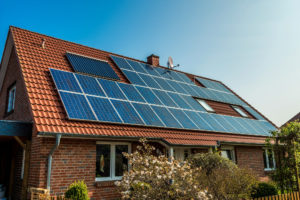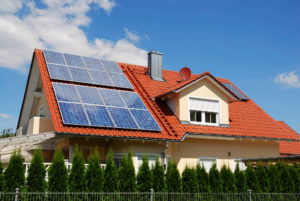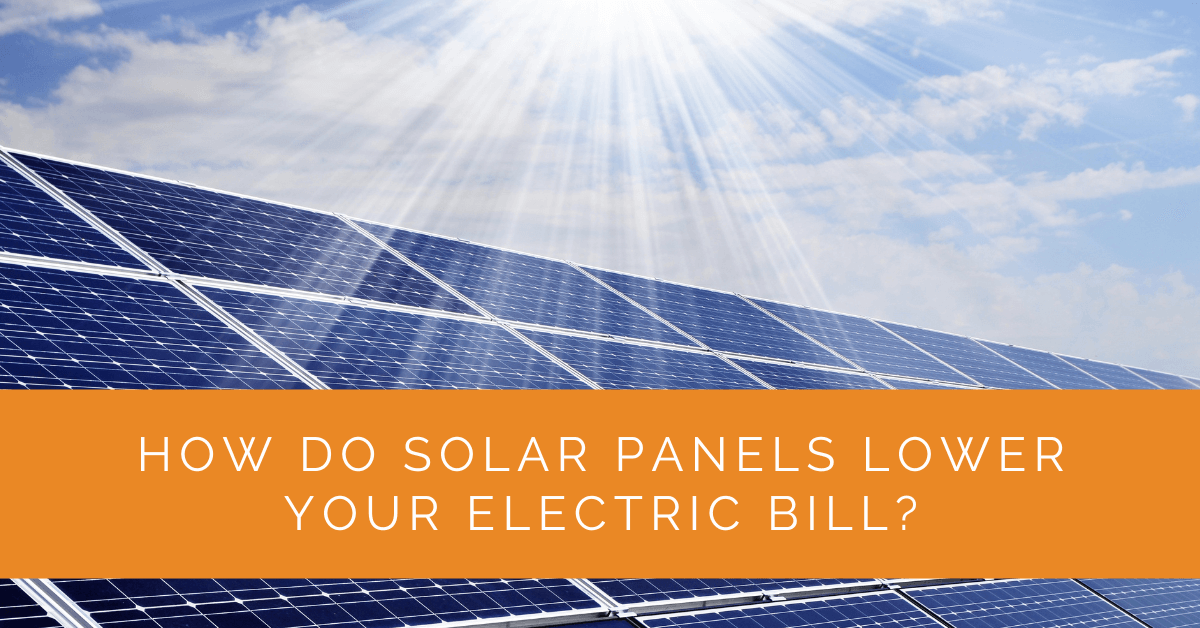Solar panels have become popular for homeowners looking to reduce their electricity bills while embracing clean and renewable energy. In this article, we will explore in detail how solar panels work, how they lower your electric bill and the long-term benefits of installing a solar panel system.
Contents
- 1 Key Takeaways
- 2 How Solar Panels Work
- 3 Lowering Your Electric Bill
- 4 Reducing Your Environmental Footprint
- 5 Case Study: How Solar Panels Lowered a Homeowner’s Electric Bill
- 6 Expert Insights From Our Solar Panel Installers About How Solar Panels Lower Your Electric Bill
- 7 Experience Solar Excellence with Us!
- 8 Conclusion
Key Takeaways
- Solar panels lower your electric bill by offsetting your energy consumption and taking advantage of net metering, resulting in immediate savings and long-term financial benefits.
- Investing in solar panels reduces your environmental footprint by reducing greenhouse gas emissions, preserving natural resources, and promoting a cleaner and healthier environment.
- Solar panels offer energy independence, grid resiliency, and stability, empowering homeowners to take control of their energy costs and contribute to a more sustainable future.
How Solar Panels Work
Solar panels operate on the principle of converting sunlight into usable electricity through a process known as the photovoltaic effect. This section will provide an in-depth understanding of how solar panels work and the intricate mechanisms involved.
Harnessing the Power of the Sun
Solar panels are composed of individual solar cells made of semiconductor materials, typically silicon. These cells are designed to absorb photons, which are particles of light, from sunlight. When photons strike the solar cells, they transfer their energy to electrons in the semiconductor material, causing the electrons to become energized and break free from their atoms.
The freed electrons flow through the semiconductor material, creating an electric current. To facilitate this flow, the solar cells are constructed with an electric field that directs the movement of electrons in a specific direction. This electric field is established by the presence of positively and negatively charged layers within the solar cell.
Producing Electricity from Sunlight
Solar panels consist of multiple interconnected solar cells, typically arranged in a grid-like pattern. These solar cells are packaged together to form a solar module or panel. Each solar cell generates a small electric current when sunlight reaches the solar panel. These currents are then combined within the panel to produce a more substantial flow of electricity.
The generated electricity is initially in the form of direct current (DC), which is the same type of electricity produced by batteries. However, since most homes and businesses use alternating current (AC) electricity, an inverter is employed to convert the DC electricity from the solar panels into AC electricity. This conversion allows the electricity generated by solar panels to be compatible with the electrical systems used in households and other buildings.
By connecting the solar panel system to the electrical grid, the excess electricity produced can be fed back into the grid for others to use. This process, known as net metering, enables solar panel owners to receive credits for the surplus electricity they generate. Net metering further reduces their electric bills and promotes clean, renewable energy use.

Lowering Your Electric Bill
Solar panels offer several ways to lower electric bills, providing immediate and long-term benefits. This section will explore the various mechanisms through which solar panels contribute to reducing your monthly electricity costs.
Offsetting Your Energy Consumption
By installing solar panels, you can generate electricity on-site directly from the sun’s energy. This allows you to offset significant energy consumption, particularly during daylight hours when the sun is abundant. The electricity produced by the solar panels powers your home, reducing the amount of electricity drawn from the grid. As a result, your reliance on utility-provided electricity decreases, leading to immediate savings on your electric bill.
Net Metering: Maximizing Savings
One of the key benefits of solar panel systems is the opportunity to take advantage of net metering. Net metering is a billing arrangement that allows solar panel owners to earn credits for the excess electricity they generate and send back to the grid. During high solar energy production periods, such as sunny days, your solar panels may produce more electricity than your household consumes. This surplus electricity is fed back into the grid, and you receive credits for the energy you contribute.
To maximize your savings through net metering, it’s important to understand how it works:
- When your solar panels generate more electricity than you use, the excess electricity flows back into the grid.
- The utility company tracks the excess electricity you send back and credits your account accordingly.
- You can draw electricity from the grid when your solar panels are not actively generating electricity, such as at night or during cloudy periods.
- The credits earned during surplus solar energy production are then applied to offset the costs of the electricity you consume from the grid.
- If your solar panels consistently generate more electricity than you consume over a billing period, you may even receive a net credit that can carry forward to future months.
Net metering effectively reduces your electric bill, as the credits earned can offset a significant portion of your energy consumption during low solar energy production periods.
Long-Term Savings and Return on Investment
While the upfront cost of installing a solar panel system can vary depending on system size and location, it is essential to consider the long-term savings and return on investment (ROI) solar panels provide. Solar panels have a typical lifespan of 25 to 30 years and require minimal maintenance. Over the life of the system, the electricity generated by solar panels can significantly offset your monthly electric bill, resulting in substantial savings.
The long-term savings and ROI are influenced by various factors, including:
- The cost of electricity from your utility company: Higher electricity rates result in greater savings from solar panel installation.
- The size and efficiency of your solar panel system: A larger and more efficient system can generate more electricity, reducing your reliance on the grid and maximizing your savings.
- Available incentives and rebates: In some areas, government incentives and utility rebates can help offset the initial cost of solar panel installation, improving the ROI.
As utility rates continue to rise, the savings from your solar panel system also increase. By generating your electricity, you are protected from future increases in electricity prices, providing stability and control over your energy costs. Additionally, the return on investment for solar panels is often favorable, with many homeowners recovering the initial installation costs within a reasonable timeframe. This results in long-term financial benefits and provides peace of mind, knowing you are producing clean energy while saving money.

Reducing Your Environmental Footprint
In addition to the financial advantages, solar panels also offer significant environmental benefits. You significantly reduce your carbon footprint by harnessing solar energy to power your home. Solar power is a clean and renewable energy source that produces electricity without emitting greenhouse gases or other harmful pollutants. By using solar energy, you actively contribute to mitigating climate change and promoting a greener and more sustainable future.
By transitioning to solar power, you decrease your reliance on fossil fuels, reducing the demand for non-renewable energy sources. This shift to clean energy helps conserve finite resources and minimizes the environmental impact associated with traditional electricity generation methods. Solar panels offer a tangible way to combat climate change by reducing greenhouse gas emissions and air pollution, fostering cleaner and healthier communities.
Moreover, using solar energy helps to preserve natural ecosystems and biodiversity. Unlike conventional power generation methods, solar power systems operate silently and do not produce noise pollution. Additionally, solar panels require minimal water for their operation, reducing strain on local water resources in regions prone to water scarcity.
Solar panels also contribute to energy independence and grid resiliency. By generating your electricity, you become less dependent on the electric grid and the volatility of utility prices. This increased self-reliance offers stability and security, particularly during power outages or disruptions. In certain cases, solar panels equipped with battery storage systems can provide backup power, ensuring a continuous energy supply for critical appliances and devices.
Case Study: How Solar Panels Lowered a Homeowner’s Electric Bill
Background
At Solar Panels Network USA, we strive to help homeowners understand the tangible benefits of solar energy. This case study highlights how one homeowner significantly lowered their electric bill by installing a solar panel system.
Project Overview
Our client, a suburban homeowner, sought to reduce their electricity costs and environmental footprint. They were interested in understanding how solar panels could achieve these goals while providing long-term financial benefits.
Implementation
Understanding Solar Panel Operation
We began by explaining the photovoltaic process, detailing how solar panels convert sunlight into usable electricity. This fundamental understanding helped the homeowner appreciate the potential for significant energy savings.
Assessing the Home’s Solar Potential
Our team conducted a thorough assessment of the property, evaluating factors such as roof orientation, shading, and local climate conditions. This assessment ensured that the solar panel system would operate at optimal efficiency.
System Design and Installation
We designed a customized solar panel system tailored to the homeowner’s energy consumption patterns and roof structure. The system included high-efficiency photovoltaic cells and a state-of-the-art inverter to convert the generated direct current (DC) into alternating current (AC) suitable for household use.
Net Metering Setup
A crucial part of the installation was setting up net metering. We coordinated with the local utility company to ensure the homeowner could earn credits for any excess electricity generated and fed back into the grid. This arrangement was explained in detail, emphasizing how it would further reduce the homeowner’s electric bill.
Results
Immediate Reduction in Energy Costs
Once the solar panels were operational, the homeowner noticed an immediate reduction in their electricity bills. The solar panels generated enough electricity to offset a significant portion of their daily energy consumption, reducing their reliance on grid power.
Maximizing Savings with Net Metering
During peak sunlight hours, the solar panels produced more electricity than the household consumed. This excess energy was fed back into the grid, earning the homeowner credits that offset their electricity usage during non-sunny periods. As a result, their monthly electric bill was further reduced.
Long-Term Financial Benefits
The homeowner was delighted with the long-term financial benefits. The initial investment in the solar panel system was recouped through savings on electricity bills and available government incentives. Over the system’s lifespan, these savings continued to grow, providing a substantial return on investment.
Summary
This case study demonstrates the effectiveness of solar panels in lowering electric bills. By generating on-site electricity and leveraging net metering, the homeowner achieved immediate and long-term financial savings. Solar Panels Network USA’s expertise ensured a smooth installation process, maximizing the system’s efficiency and financial benefits. This project highlights the value of solar energy in promoting sustainable living and financial independence for homeowners.
Expert Insights From Our Solar Panel Installers About How Solar Panels Lower Your Electric Bill
Solar panels significantly reduce your electric bill by generating electricity on-site, which offsets your energy consumption. This immediate reduction in grid dependency translates to lower monthly electricity costs for homeowners.
Senior Solar Installer
Net metering is a game-changer for solar panel owners. By earning credits for the excess electricity produced and fed back into the grid, homeowners can further lower their electric bills and maximize their savings.
Lead Solar Technician
The long-term financial benefits of solar panels are substantial. Beyond the initial installation costs, solar panels provide ongoing savings by protecting homeowners from rising utility rates and contributing to a more sustainable future.
Solar Energy Consultant
Experience Solar Excellence with Us!
Trust in Solar Panels Network USA, where our seasoned experts deliver top-quality solar solutions for homes and businesses nationwide. With a legacy of countless successful installations and a commitment to sustainable energy, we’re your reliable partner in the solar journey. Ready for a brighter, eco-friendly future? Call us now at (855) 427-0058 and harness the power of the sun!
Conclusion
Solar panels can remarkably lower your electric bill while delivering numerous environmental benefits. Solar panels generate clean and renewable electricity by harnessing the sun’s power, reducing your reliance on the grid. You can maximize savings by earning credits for excess energy production through mechanisms like net metering. The long-term financial advantages, return on investment, and reduced environmental footprint make solar panels attractive for homeowners seeking a sustainable and cost-effective energy solution.
Installing solar panels offers immediate savings and long-term financial benefits. It positively contributes to the planet by reducing greenhouse gas emissions, preserving natural resources, and promoting a cleaner and healthier environment. Embracing solar power empowers individuals and communities to take an active role in the global transition to clean energy, impacting future generations.
About the Author
Solar Panels Network USA stands at the forefront of solar energy solutions, driven by a team of seasoned solar engineers and energy consultants. With over decades of experience in delivering high-quality solar installations and maintenance, we are committed to promoting sustainable energy through customer-centric, tailored solutions. Our articles reflect this commitment, crafted collaboratively by experts to provide accurate, up-to-date insights into solar technology, ensuring our readers are well-informed and empowered in their solar energy decisions.

